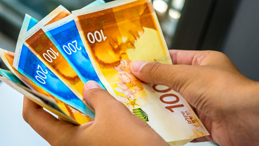Thanks to its strong currency, Israel has emerged relatively unscathed from surging inflation rates seen in other parts of the world linked to supply chain disruptions.
The shekel has been holding at a rate of a little over 3.2 to the dollar in recent weeks, having gained roughly 2.6% against several other currencies since the start of the year. In January, the shekel achieved its strongest level since 1996, standing at 3.11 per dollar.
However, the strengthening of the shekel could see businesses scrambling to offshore lucrative high-tech jobs, according to economic experts. “
"A strong shekel could see the loss of local jobs to other, cheaper countries, such as India and Eastern Europe, for the high-tech industry,” Andy Kaye, president and chief institutional officer of the Jerusalem-based investment platform OurCrowd, said.
Kaye, a veteran investment banker, said that while the shekel is a sign of Israel’s strong economy and is good for imports, it has made both exports and hiring local talent significantly more expensive than it used to be.
“We raise money in dollars and report in dollars, but companies are paying employees in shekels,” he explained. “Companies are therefore paying more for rent and in many cases, for employment as well.”
The Israeli tech sector has continued to grow through the pandemic, raising record amounts over capital over the past year.
“Last year, we finished at over $10 [billion] and we were feeling really great; this year we’re at over $18 billion to date of investments made in Israeli [high-tech],” Kaye affirmed. “That’s a lot.”
According to Kaye, the strong shekel has not negatively impacted the flow of investments.
Additionally, it has helped to offset inflation, which has hit many other countries hard due to the pandemic. Europe has seen its inflation reach a 13-year high, while the US’s inflation rate stood at 5.3% from August 2020 to August 2021. By contrast, in Israel, the year-to-date inflation rate stood at a much lower 2.2%.
“We remain extremely positive about the Israeli high-tech industry,” Kaye said. “The market is cyclical and at some stage, I believe, there will be a correction. That will have implications on the globe and I’m sure on Israel as well.”
Since Israel emerged from lockdowns and severe COVID-19 restrictions in March, its economy has rapidly recovered and is projected to grow over 5% this year, according to official figures. The growth comes on the backdrop of strong shows in exports, consumer spending and investments.
3 View gallery


A Tel Aviv bar enjoys good business after COVID restrictions were lifted earlier this year
(Photo: Moti Kimchi)
Israel’s export of goods and service sharply grew in the first half of 2021, rising 24% over that period in comparison to 2020, according to the Ministry of Economy and Industry. Exports for 2021 are expected to reach $135 billion overall, marking a 20% increase over last year.
Like Kaye, Dr. Alex Coman, an economic specialist at the Adelson School of Entrepreneurship at Israel’s Interdisciplinary Center Herzliya, also believes that the strong shekel could have a negative impact on local employment.
“One solution that you might see, for instance in the high-tech industry, is offshore activities,” Coman said. “If I have employees in India, Russia and Eastern Europe, their currencies are weaker and this would make me immune to the fact that the shekel is strong.”
In a bid to weaken the shekel, the Bank of Israel has said that it would buy $30 billion of foreign currency over 2021, up from $21 billion last year. By doing so, it aims to increase the supply of the shekel and thereby lead to its devaluation.
So far the move has had little effect.
“The impact of the central bank is very limited,” Coman asserted. “As long as Israel is creative and leading in the high-tech industry, I believe that the shekel will face this problem.”
Article written by Maya Margit
Reprinted with permission from The Media Line



